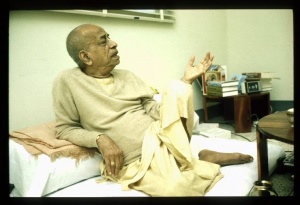SB 6.18.6: Difference between revisions
m (1 revision(s)) |
(Vanibot #0054 edit - transform synonyms into clickable links, which search similar occurrences) |
||
| (One intermediate revision by one other user not shown) | |||
| Line 1: | Line 1: | ||
{{info | {{info | ||
|speaker= | |speaker=Śukadeva Gosvāmī | ||
|listener=King | |listener=King Parīkṣit | ||
}} | }} | ||
[[Category:Srimad-Bhagavatam - Canto 06 Chapter 18|s06 ]] | |||
[[Category:Bhagavatam Verses Spoken by Sukadeva Gosvami - Vanisource|061806]] | |||
<div style="float:left">'''[[Srimad-Bhagavatam]] - [[SB 6|Sixth Canto]] - [[SB 6.18: Diti Vows to Kill King Indra|Chapter 18: Diti Vows to Kill King Indra]]'''</div> | |||
<div style="float:right">[[File:Go-previous.png|link=SB 6.18.5]] '''[[SB 6.18.5]] - [[SB 6.18.7]]''' [[File:Go-next.png|link=SB 6.18.7]]</div> | |||
{{RandomImage}} | |||
==== TEXT 6 ==== | ==== TEXT 6 ==== | ||
<div class="verse"> | |||
<div | :retaḥ siṣicatuḥ kumbhe | ||
retaḥ siṣicatuḥ kumbhe | :urvaśyāḥ sannidhau drutam | ||
urvaśyāḥ sannidhau drutam | :revatyāṁ mitra utsargam | ||
revatyāṁ mitra utsargam | :ariṣṭaṁ pippalaṁ vyadhāt | ||
ariṣṭaṁ pippalaṁ vyadhāt | |||
</div> | </div> | ||
| Line 17: | Line 22: | ||
==== SYNONYMS ==== | ==== SYNONYMS ==== | ||
<div class="synonyms"> | |||
<div | ''[//vanipedia.org/wiki/Special:VaniSearch?s=retaḥ&tab=syno_o&ds=1 retaḥ]'' — semen; ''[//vanipedia.org/wiki/Special:VaniSearch?s=siṣicatuḥ&tab=syno_o&ds=1 siṣicatuḥ]'' — discharged; ''[//vanipedia.org/wiki/Special:VaniSearch?s=kumbhe&tab=syno_o&ds=1 kumbhe]'' — in an earthen pot; ''[//vanipedia.org/wiki/Special:VaniSearch?s=urvaśyāḥ&tab=syno_o&ds=1 urvaśyāḥ]'' — of Urvaśī; ''[//vanipedia.org/wiki/Special:VaniSearch?s=sannidhau&tab=syno_o&ds=1 sannidhau]'' — in the presence; ''[//vanipedia.org/wiki/Special:VaniSearch?s=drutam&tab=syno_o&ds=1 drutam]'' — flown; ''[//vanipedia.org/wiki/Special:VaniSearch?s=revatyām&tab=syno_o&ds=1 revatyām]'' — in Revatī; ''[//vanipedia.org/wiki/Special:VaniSearch?s=mitraḥ&tab=syno_o&ds=1 mitraḥ]'' — Mitra; ''[//vanipedia.org/wiki/Special:VaniSearch?s=utsargam&tab=syno_o&ds=1 utsargam]'' — Utsarga; ''[//vanipedia.org/wiki/Special:VaniSearch?s=ariṣṭam&tab=syno_o&ds=1 ariṣṭam]'' — Ariṣṭa; ''[//vanipedia.org/wiki/Special:VaniSearch?s=pippalam&tab=syno_o&ds=1 pippalam]'' — Pippala; ''[//vanipedia.org/wiki/Special:VaniSearch?s=vyadhāt&tab=syno_o&ds=1 vyadhāt]'' — begot. | ||
</div> | </div> | ||
| Line 25: | Line 29: | ||
==== TRANSLATION ==== | ==== TRANSLATION ==== | ||
<div class="translation"> | |||
<div | |||
Upon seeing Urvaśī, the celestial society girl, both Mitra and Varuṇa discharged semen, which they preserved in an earthen pot. The two sons Agastya and Vasiṣṭha later appeared from that pot, and they are therefore the common sons of Mitra and Varuṇa. Mitra begot three sons in the womb of his wife, whose name was Revatī. Their names were Utsarga, Ariṣṭa and Pippala. | Upon seeing Urvaśī, the celestial society girl, both Mitra and Varuṇa discharged semen, which they preserved in an earthen pot. The two sons Agastya and Vasiṣṭha later appeared from that pot, and they are therefore the common sons of Mitra and Varuṇa. Mitra begot three sons in the womb of his wife, whose name was Revatī. Their names were Utsarga, Ariṣṭa and Pippala. | ||
</div> | </div> | ||
| Line 33: | Line 36: | ||
==== PURPORT ==== | ==== PURPORT ==== | ||
<div class="purport"> | |||
<div | |||
Modern science is trying to generate living entities in test tubes by processing semen, but even long, long ago it was possible for semen kept in a pot to develop into a child. | Modern science is trying to generate living entities in test tubes by processing semen, but even long, long ago it was possible for semen kept in a pot to develop into a child. | ||
</div> | </div> | ||
__NOTOC__ | |||
<div style="float:right; clear:both;">[[File:Go-previous.png|link=SB 6.18.5]] '''[[SB 6.18.5]] - [[SB 6.18.7]]''' [[File:Go-next.png|link=SB 6.18.7]]</div> | |||
__NOTOC__ | |||
__NOEDITSECTION__ | |||
Latest revision as of 22:36, 18 February 2024

A.C. Bhaktivedanta Swami Prabhupada
TEXT 6
- retaḥ siṣicatuḥ kumbhe
- urvaśyāḥ sannidhau drutam
- revatyāṁ mitra utsargam
- ariṣṭaṁ pippalaṁ vyadhāt
SYNONYMS
retaḥ — semen; siṣicatuḥ — discharged; kumbhe — in an earthen pot; urvaśyāḥ — of Urvaśī; sannidhau — in the presence; drutam — flown; revatyām — in Revatī; mitraḥ — Mitra; utsargam — Utsarga; ariṣṭam — Ariṣṭa; pippalam — Pippala; vyadhāt — begot.
TRANSLATION
Upon seeing Urvaśī, the celestial society girl, both Mitra and Varuṇa discharged semen, which they preserved in an earthen pot. The two sons Agastya and Vasiṣṭha later appeared from that pot, and they are therefore the common sons of Mitra and Varuṇa. Mitra begot three sons in the womb of his wife, whose name was Revatī. Their names were Utsarga, Ariṣṭa and Pippala.
PURPORT
Modern science is trying to generate living entities in test tubes by processing semen, but even long, long ago it was possible for semen kept in a pot to develop into a child.